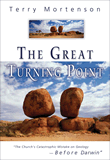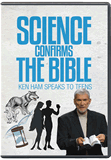Simple Complex Genesis
The Genesis 1 account is both simple and yet profound. And this makes sense as God didn’t write the Bible or specifically the creation account just for the highly educated.
As a believer I would like to believe that Genesis is a literal account of Creation. I feel that theistic evolution particularly by our Churches leads to credibility issues. However the account of creation seems very simplistic and yet very profound at another level. Are we to assume that when God 'made' things he did so in a non scientific way (ie totally supernatural) and if so does that make all scientific explanation redundant?
It is nice to hear from you. You are absolutely right in that theistic evolution really does have credibility issues.
Theistic evolution does have problems!
The Bible and evolution are simply incompatible by the orders of events in each, theological problems, and so on. Here are a couple of articles that discuss this:
Creation Is Simple Yet Profound!
Also, you are right about the Genesis 1 account being both simple and yet profound. And this makes sense as God didn’t write the Bible or specifically the creation account just for the highly educated. Even children can understand such a theme. Kids can read Genesis 1 and get it; and yet professors can read it over and over and get something new. Theologians call this the perspicuity (or clarity) of Scripture.
Consider for a moment Genesis 1:1. “In the beginning God created the heavens and the earth.
” A child can grasp this simple statement. But consider this from another angle. God refutes most other worldviews with this statement, such as atheism, agnosticism, pantheism, polytheism, materialism, dualism, humanism, and evolutionism.1 When compared with other passages, we can see how this verse also refutes Unitarianism in the way it uses the term “God” (Elohim).2 The profound statement of the Bible’s first verse is an apt opening for the Triune God of the Bible. For more information on the existence of God, see “Is There Really a God Who Created the Universe?”3
But further, by way of analogy, many of the things God created can be used to help us understand something about His triune nature. These analogies should not be pressed too far, because all analogies for the Trinity will ultimately fall short, but these are cited to demonstrate the “three-in-one” concept. It is traditionally stated that St. Patrick used a three leaf clover to illustrate the Trinity when presenting Christianity to Ireland, and church fathers often used an equilateral triangle. Henry Morris used the analogy of the matter-space-time universe, three measurable entities individually but inseparable because they cannot exist independent of one another.4
Now let’s look closely at Genesis 1 to see some of these analogies. God created time, which we experience as proceeding from past to present to future, and at one point, at an absolute present, it is all three at once where they converge.5 God created space (heavens and earth), which is triune, having length, width, and height. There was water on the first day, a triune molecule, that even has a triple point where it is solid, liquid, and gas at the exact same time! Light was also made on the first day, and it is also triune in nature having an electrical component, magnetic component, and velocity. And yet unlike these creations that seem to reflect some triune aspect of God, none of these creations equate to man who is indeed said to be made in the image of God later in Creation Week.
Note the complexity and yet simplicity. God was not unwise in the least when He inspired the writing of Genesis 1 to tell about what He did during Creation Week.
Creation is unique!
The Creation Week is unique in that creation is not something that we typically observe or quantify through our everyday scientific methodology (observe and repeat). It was an event in the past. One law that now operates within the creation as upheld by God is that we can neither create nor destroy matter and energy (known as the first law of thermodynamics).
That uniformity of nature is the basis for being able to do science in the first place.
Scientific laws by their very nature work within the creation and could not rightly be in place until creation occurred. Upon creation, God upholds things in a particular fashion and has even promised that He would continue to do so until the end (Genesis 8:22; Hebrews 1:3). That uniformity of nature is the basis for being able to do science in the first place, and it explains why many founders of scientific disciplines were Bible-believing Christians like Newton, Faraday, Boyle, Pasteur, etc. The secular world must borrow from the Bible in order to make sense of this uniformity. After all, if the universe blew up from nothing, why would we have these beautifully ordered sets of laws that the universe obeys?
Some people struggle with the issue of God being allegedly bound to His creation (e.g., saying things like: “God can’t do miracles, as that violates the laws He made”). First, how would we know if God violated one of His own laws, since we don’t understand all the laws in the universe yet anyway?
Second, the Creator is not bound to His creation. He is not held to laws by which He upholds creation. In other words, God is not subservient to such laws, but they are subservient to Him. God can create and destroy if He wishes. For example, the Lord created food for 5,000 men (Mark 6:39–44). So the Creation Week could have been entirely supernatural and the creative powers of God in no way violate the scientific principles that the rest of creation is normatively bound to.
However, based on Genesis 1, it is likely that God used a combination of His creative and upholding powers during creation. For example, water is held together by forces that God upholds and put in place on Day 1, when water was created (the earth was originally formless and apparently pure water according to Genesis 1:2).6 But God then applied formative actions (e.g., separating and gathering waters), either making things from material He created (generally asah in Hebrew) or creating ex-nihilo (i.e., “out of nothing,” generally bara in Hebrew) throughout the rest of the Creation Week, though there is some overlap in these Hebrew terms.7
The point is that God is not a part of His creation, nor is He bound by it, so He is not constrained to the scientific principles He created, which are actually our man-made descriptions of the creation and how it works today. But Creation Week was indeed unique, and upon creation’s completion, with the exception of God intervening in this world, He generally upholds the universe in a consistent fashion. But God is by no means obligated to remain subject to those physical laws which apply to the physical world.
I pray this helps clarify. And with this, all scientific explanation should not be rendered unnecessary or considered redundant, as you put it. Instead, scientific research must be placed, like all things, under the interpretive lens of God’s Word, rather than viewing the conclusions of scientists as the ultimate truth, since they are often based on man’s fallible and imperfect ideas.
God bless,
Bodie Hodge
Footnotes
- Henry M. Morris, The Genesis Record, (Grand Rapids, MI: Baker Book House, 1976), p. 38.
- The term Elohim is a plural noun that can refer to God (e.g., Genesis 1:3), angels (e.g., Psalm 8:5), demons (e.g., Deuteronomy 32:17), false gods (e.g., Exodus 20:3), and more, but it is often used with a singular verb when referring to the true God. This is the way it is used in Genesis 1:1, a plural noun with a singular verb. Many commentators, such as Henry Morris, have held that this construction is an indication of plurality within the Godhead, which is consistent with the Triune God, thus refuting Unitarianism (Morris, p. 39). On the other hand Mathews was more cautious when he wrote, “Since its [Elohim] plurality does not designate more than one entity, its morphological shape does not necessarily refer to the plurality of the Godhead. It is unreasonable to burden this one word Elohim with a developed view of the Christian Trinity. It is fair to say, however, that the creation account (1:2, 26–27) implies that there is a plurality within God.” Kenneth Mathews, The New American Commentary: Genesis 1–11:26, (Nashville, TN: Broadman & Holman Publishers, 1996), p. 127.
- Also see the chapter from the News Answers Book 3 on the existence of God: Ken Ham, Gen. Ed., New Answers Book 3, (Green Forest, AR: Master Books, 2010, pp. 263–270.
- Henry Morris, Studies in the Bible and Science (Philadelphia: Presbyterian & Reformed, 1966), pp. 172–179.
- Absolute present is the instant that is momentarily between future as it becomes the past. Consider this graphically for a moment and draw a timeline from left to right; the present is actually moving along that line from left to right. Everything on the left of that line is past, and everything that is right of that line is future. Absolute present is the where future and past gets infinitely close to that moving line.
- Dr. Andrew Snelling commented, “Once God created water out of nothing, unless He tells us He supernaturally did something else with the water (such as on Day Two), it obeyed the law of gravity He had also created, so water ran downhill. Thus on Day Three when God made the dry land by uplifting rocky materials from under the universal ocean of Days One and Two, the water running off the land (being newly uplifted) would have eroded sediments that were then deposited offshore of the new continental landmass, on which God then created plants. Today we can study those sedimentary rocks scientifically. However, because these rocks date back to the Creation Week we cannot assume (as secular geologists do) that they were deposited at today’s slow rates of sedimentation.” For more information, please see Thirty Miles of Dirt in a Day.
- For example, in Genesis 1:26, God said, “
Let Us make
[asah]man . . .
,” and Genesis 1:27 states that “God created
[bara]man . . . .
” See “Understanding Genesis 1 Hebrew: Create (bara) & Make (asah).”
Recommended Resources

Answers in Genesis is an apologetics ministry, dedicated to helping Christians defend their faith and proclaim the good news of Jesus Christ.
- Customer Service 800.778.3390
- © 2024 Answers in Genesis








